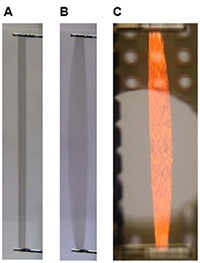Mar 20 2009
Researchers at the UT Dallas Alan G. MacDiarmid NanoTech Institute have demonstrated a fundamentally new type of artificial muscle, which can operate at extreme temperatures where no other artificial muscle can be used -- from below the temperature of liquid nitrogen (-196° C) to above the melting point of iron (1538° C).
 A. An artificial muscle strip with no voltage applied. B. The above artificial muscle strip with 5 kV applied. C. An artificial muscle strip actuated at 1500 K using 5 kV applied voltage.
A. An artificial muscle strip with no voltage applied. B. The above artificial muscle strip with 5 kV applied. C. An artificial muscle strip actuated at 1500 K using 5 kV applied voltage.
The discovery is reported in the March 20 issue of Science under the title “Giant Stroke, Superelastic Carbon Nanotube Aerogel Muscles.”
Once actuated (or put into motion) in a certain direction, these new artificial muscles can elongate 10 times more than natural muscles and at rates 1,000 times higher than a natural muscle. In another direction, when densified, they can generate thirty times the force of a natural muscle having the same cross-sectional area. While natural muscles can contract at about 20 percent per second, the new artificial muscles can contract at about 30,000 percent per second.
These artificial muscles are carbon nanotube aerogel sheets made by a novel solid-state process developed at UT Dallas. Sometimes called frozen smoke, aerogel is a low-density solid-state material derived from a gel in which the liquid component of the gel has been replaced with gas. Aerogels are comprised mostly of air. The starting material is an array of vertically aligned carbon nanotubes manufactured under a chemical heat process. Because of the special arrangement of these nanotube arrays, which are called forests because they look like a bamboo forest, the carbon nanotubes can be pulled into sheets at speeds of up two meters per second. The sheets have such low density that an ounce would cover an acre.
When scientists apply a voltage to the carbon nanotube aerogel sheets, the nanotubes repulse, or push away from one another, which in effect works the muscle. These transparent sheets have strange properties that are important for muscle operation. While having about the density of air, in one direction, they have higher specific strength (strength/density) than a steel plate. When stretched in another direction, they provide rubber-like stretchability, but by a mechanism quite different than for ordinary rubber. Because of their nanoscale and microscale structure, they amplify a percent stretch in the nanotube orientation direction to a percent 15 times larger than the percent they contract laterally.
“Our discovery of methods for producing these carbon nanotube sheets, their strange properties, and their corresponding remarkable performance as artificial muscles is just the beginning of a story, which will likely be taken in new directions by researchers around the world,” said Dr. Ray H. Baughman, one of the article’s authors, who is the Robert A. Welch Professor of Chemistry and director of the NanoTech Institute. “My guess is that this story will have a happy ending in terms of new products that benefit humankind.”
The ability to either permanently or reversibly tune a nanotube sheet density by flexing it, and the ability to change the shape of the sheet will likely provide the earliest applications of this technology. Due to their extremely light weight and variable density, carbon nanotube aerogels may become highly desired for use in artificial muscles and solar cells. The conductive properties of these nanotube aerogels, along with their ability to drastically expand their surface area, can improve solar cells by making them more efficient at collecting and storing energy.
In addition, because no other artificial muscle can actuate at such extreme low and high temperatures, applications for these muscles might develop for use in space exploration, where a hostile environment prohibits use of any other actuating material.